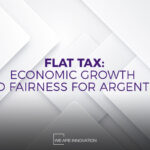North America’s region has been characterized by various governmental and structural mechanisms varying among different countries. This happens mainly due to governmental actions and policies that have affected economic competitiveness over time, in addition to private property protection and respect for contracts. The latter says a lot about how this generation of competitiveness can take place.
The latest edition of the World Competitiveness Ranking shows that the United States remains at the top of this ranking and has even moved up one spot (from 10th to 9th place). They are followed by Canada, which lost a spot (from 14th to 15th), and finally, the third largest economy in the area, Mexico, which lost one more place in this ranking (from 55th to 56th).
This phenomenon is largely due to the continuity of economic institutions. It’s worth mentioning that after years of “global isolation,” the ability to solve problems and devise strategies was a crucial factor in determining how countries would resume “normality” after the end of the pandemic and successive lockdowns. This includes the increase in public spending to “mitigate” or combat the ravages of the pandemic, with the consequent inflationary pressure. Thus, inflation in several Latin American countries (Mexico being the worst ranked and part of LATAM) and which has been pointed out both by ECLAC and the IMF as “food inflation,” has increased by up to 11.9 percent (7.8 percent in Mexico in 2022).
Here we could draw an important correlation with the institutional quality of each of the governments of the three countries measured in the ranking, as well as the competitiveness scores each one has; the 2023 Institutional Quality Index developed by RELIAL shows the importance of institutional solidity, and how it becomes a stability factor in different countries. Institutional stability allows countries to have legal bases that generate conditions for contracts to be respected, for citizens’ private property to be protected, and therefore, for commerce to occur.
A specific correlation can be established between institutional quality and competitiveness: institutional quality becomes a straitjacket that is generally established as a brake on the indiscriminate use of political power and through which this abuse of power can (and indeed does) affect the economic freedom of countries and therefore, competitiveness itself.
Easy governance without excessive bureaucracy allows markets to generate a higher quality of life for a country’s citizens. This can even be observed when reviewing the places where the three countries have been ranked in infrastructure.
Canada ranks 11th according to the latest edition of the ranking. This has been a challenging position, with 2020 and 2021 being the years it broke into the top 10 with 8th place. On the other hand, its worst performance recorded in terms of the infrastructure of the maple leaf country is the year 2019, placing itself in 12th place.
The United States, while the largest economy in the region, has shown changes since 2019, positioning itself at the top of the list. However, this has changed in recent years, jumping between 5th and 7th place, confirming that the country is in good positions of competitiveness compared to the other two.
Mexico, since 2019, has shown a drop in this area, moving from 57th to 59th place out of the 64 countries evaluated by this index, placing it as the worst-ranked in the area.
At the same time, a certain parallelism is noted between the efficiency of the government and the own business efficiency of these countries, which also relates to the institutional quality provided by them.
In the case of Canada and the United States, we can observe significant business efficiency. The latest data collected for the 2023 edition put both countries in 17th (for the former) and 14th (for the latter) places. Meanwhile, Mexico lags behind at 51st place, virtually at the bottom of the ranking in the business efficiency category.
Business efficiency largely depends on government efficiency. In this sense, both Canada and the United States have maintained a semi-stable fluctuation. For the maple leaf country, its best performance was in 2020, reaching 10th place, while in the latest edition of this ranking, its position is set at 16th place.
The United States, on the other hand, has an interesting situation. Unlike other indicators, its best performance occurred in 2019, positioning itself in 23rd place, while in this latest edition, it reached 25th place. This might seem significant, but it is essential to emphasize that the lowest ranking for both countries was in 2021 and 2022. For the 2023 version of the ranking, both countries have returned to a greater pre-pandemic governmental efficiency, reflected in their competitiveness ranking advance.
On the contrary, Mexico improved its governmental efficiency and moved from 52nd place in 2019 to 60th in 2023. This implies that it worsened in terms of public spending, increased its perks and subsidies, and even established price controls during these years for some products and services.
Finally, it is vital to point out something. Countries with low tax pressure and reasonable control of public spending have an advantage. The same is true if they have few labor restrictions or trade barriers. They are more likely to rise in the ranking. If the opposite occurs, there are problems. Economic freedom will be reduced if tax collection increases and public spending skyrockets. Also, if institutions are weak, there will be adverse effects. There will be less purchasing power, a lack of goods and services, and inflation. These situations can affect their position in the ranking.
A country’s place in the ranking can go up or down. This depends on the measures and policies implemented to improve the economy.
*Jorge Alberto Ruiz Meza is passionate about the subject of freedom, Political Economy, and State Political Theory; he has a master’s degree in Public Management and a degree in Economics and Finance, is a project associate at the Tomás de Mercado Society and an Intern at the International Bases Foundation.
Source: We are Innovation











